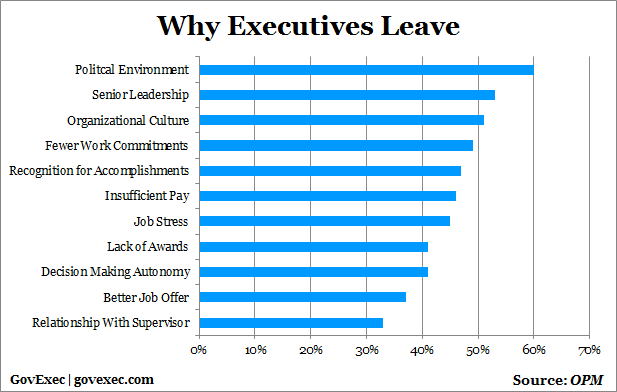
Kzenon/Shutterstock.com
Senior executives who leave federal service do so largely because of the political environment and to make more money, according to a new survey of those exiting government.
Seven in 10 respondents participating in the Office of Personnel Management exit survey were resigning or retiring from the Senior Executive Service, while 12 percent of respondents said they were leaving to work at another agency. Two percent planned to accept a non-SES position in government. Of those leaving federal service, about half expected to work again; among that population, nearly 60 percent expected a pay raise.
More than 60 percent would recommend their agency as a good place to work. About the same percentage would recommend the SES to others, although 40 percent of respondents had held executive positions for only five years or less. About one in 10 said they were leaving SES after less than one year.
The number one reason SESers gave for leaving was the political environment, with 60 percent saying politics was a factor in their decision. A majority of senior executives said senior leadership and the organizational culture of their agency were contributing factors as well. Other top reasons included lack of recognition for accomplishments, job stress, insufficient pay, a lack of awards and too much oversight in decision making.

Despite those challenges, many said they could have been convinced to stay. Seven in 10 respondents said their agency never encouraged them to stay. Nearly 40 percent said a pay raise would have caused them to reconsider their decision, while one-quarter said verbal encouragement or an award could have changed their minds.
Nearly 85 percent of departing senior execs reported receiving “outstanding” or “fully successful” performance ratings, though just 77 percent said the rating accurately reflected their performance.
“The information in the report will be used to support agency and governmentwide recruitment, engagement, retention, and succession planning efforts for current and future executives,” OPM Director Katherine Archuleta wrote in a memorandum to agency human resources chiefs. “With many SES eligible for retirement in the near future, it is imperative for agencies to understand what they can do to engage and retain executives, while mitigating factors that cause executives to leave the federal government.”
OPM surveyed 221 departing SES employees from 24 agencies between April 2013 and July 2014. It crafted questions in partnership with the Senior Executives Association, the National Academy of Public Administration, the Partnership for Public Service and agency representatives.
(Image via Kzenon/Shutterstock.com)







